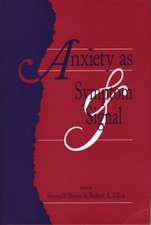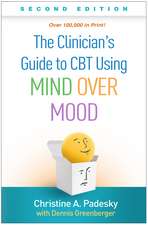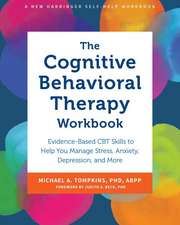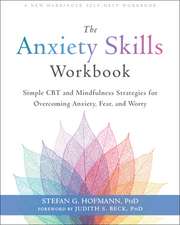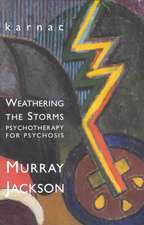Cognitive Therapy for Challenging Problems: What to Do When the Basics Don't Work
Autor Judith S. Becken Limba Engleză Paperback – 17 aug 2011
See also Dr. Beck's Cognitive Behavior Therapy, Second Edition: Basics and Beyond, the leading text for students and practicing therapists who want to learn the fundamentals of CBT.
Preț: 259.60 lei
Preț vechi: 273.26 lei
-5% Nou
Puncte Express: 389
Preț estimativ în valută:
49.67€ • 52.00$ • 41.10£
49.67€ • 52.00$ • 41.10£
Carte disponibilă
Livrare economică 15-29 martie
Livrare express 01-07 martie pentru 29.88 lei
Preluare comenzi: 021 569.72.76
Specificații
ISBN-13: 9781609189907
ISBN-10: 1609189906
Pagini: 324
Dimensiuni: 152 x 229 x 23 mm
Greutate: 0.41 kg
Ediția:1
Editura: Guilford Publications
Colecția Guilford Press
ISBN-10: 1609189906
Pagini: 324
Dimensiuni: 152 x 229 x 23 mm
Greutate: 0.41 kg
Ediția:1
Editura: Guilford Publications
Colecția Guilford Press
Public țintă
Professional Practice & DevelopmentNotă biografică
Judith S. Beck, PhD, is President of the Beck Institute for Cognitive Behavior Therapy (www.beckinstitute.org), a nonprofit organization that provides state-of-the-art training and certification in CBT to individuals and organizations, offers online courses on a variety of CBT topics, conducts research, and serves as a leading global resource in CBT. She is also Clinical Professor of Psychology in Psychiatry at the University of Pennsylvania Perelman School of Medicine. Dr. Beck has written over 100 articles and chapters as well as books, workbooks, and pamphlets for professionals and nonprofessionals, including Cognitive Behavior Therapy, Third Edition: Basics and Beyond and Cognitive Therapy for Challenging Problems: What to Do When the Basics Don’t Work. She has made hundreds of presentations nationally and internationally on various applications of CBT and is the primary developer of the Beck Institute’s online CBT training courses, which have been taken by health and mental health professionals in over 130 countries. Dr. Beck maintains a clinical caseload at the Beck Institute’s in-house clinic in suburban Philadelphia, helping clients who are experiencing a range of challenges.
Cuprins
Foreword, Aaron T. Beck
1. Identifying Problems in Treatment
2. Conceptualizing Patients Who Present Challenges
3. When a Personality Disorder Challenges Treatment
4. Developing and Using the Therapeutic Alliance
5. Therapeutic Relationship Problems: Case Examples
6. When Therapists Have Dysfunctional Reactions to Patients
7. Challenges in Setting Goals
8. Challenges in Structuring the Session
9. Challenges in Solving Problems and in Homework
10. Challenges in Identifying Cognitions
11. Challenges in Modifying Thoughts and Images
12. Challenges in Modifying Assumptions
13. Challenges in Modifying Core Beliefs
Appendix A: Resources, Training, and Supervision in Cognitive Therapy
Appendix B: Personality Belief Questionnaire
1. Identifying Problems in Treatment
2. Conceptualizing Patients Who Present Challenges
3. When a Personality Disorder Challenges Treatment
4. Developing and Using the Therapeutic Alliance
5. Therapeutic Relationship Problems: Case Examples
6. When Therapists Have Dysfunctional Reactions to Patients
7. Challenges in Setting Goals
8. Challenges in Structuring the Session
9. Challenges in Solving Problems and in Homework
10. Challenges in Identifying Cognitions
11. Challenges in Modifying Thoughts and Images
12. Challenges in Modifying Assumptions
13. Challenges in Modifying Core Beliefs
Appendix A: Resources, Training, and Supervision in Cognitive Therapy
Appendix B: Personality Belief Questionnaire
Recenzii
This is a highly practical guide for using cognitive therapy with patients who present challenging problems to clinicians with diverse levels of experience. An excellent hands-on text for graduate-level courses and for novice therapists, it can also fruitfully guide mature practitioners who wish to expand their realm of expertise. Enriched with numerous illuminating case materials, the book will enlighten even the most experienced mental health worker.--Theodore Millon, PhD, DSc, Institute for Advanced Studies in Personology and Psychopathology
Clinicians have been reporting for some time now that they are seeing increasingly difficult cases in their consulting rooms. Axis I and Axis II comorbidities have become the rule rather than the exception. By systematically addressing these challenges in this clearly written and eminently readable volume, Judith Beck takes cognitive therapy to a new level. This book will be equally useful to students and to experienced therapists.--Glen O. Gabbard, MD, Department of Psychiatry, Baylor College of Medicine
This excellent book focuses on the art of cognitive therapy. When therapy does not seem to be going well, most clinicians can think of another therapist who they think would fare better. This book teaches you how to become that therapist. Drawing on her vast experience with therapists and clients, Dr. Beck beautifully outlines how to identify and overcome many of the difficulties that can arise in cognitive therapy. As a consequence, therapists will be heartened and more patients will experience the benefits they hope for. Highly recommended reading for novice to highly experienced cognitive therapists.--David M. Clark, DPhil, Department of Experimental Psychology, University of Oxford, United Kingdom
-Judith Beck's first book, Cognitive Behavior Therapy, Second Edition: Basics and Beyond, was a godsend to me in my first post when I had little access to CBT supervision....I was keen to read the sequel...'What to Do When the Basics Don't Work,' and I was not disappointed. The book is structured in a similar form to its predecessor, with chapters devoted to each of the essentials of cognitive therapy; formulation, the therapeutic relationship, structuring sessions, identifying cognitions etc....Points are illustrated with case examples and transcripts of sessions, which provide very useful models of exactly how to address tricky issues such as people who keep talking and become controlling whenever a therapist becomes directive....Given the proliferation of cognitive therapy courses, the relative lack of experienced supervisors, and the complexity of cases seen, more and more therapists are likely to feel the need for advice on what to do when the basics don't work. Fortunately, this timely arrival goes a long way to filling that gap.--Behavioural and Cognitive Psychotherapy, 7/7/2011ƒƒClinicians have been reporting for some time now that they are seeing increasingly difficult cases in their consulting rooms. Axis I and Axis II comorbidities have become the rule rather than the exception. By systematically addressing these challenges in this clearly written and eminently readable volume, Judith Beck takes cognitive therapy to a new level. This book will be equally useful to students and to experienced therapists.--Glen O. Gabbard, MD, Department of Psychiatry, Baylor College of Medicine
This excellent book focuses on the art of cognitive therapy. When therapy does not seem to be going well, most clinicians can think of another therapist who they think would fare better. This book teaches you how to become that therapist. Drawing on her vast experience with therapists and clients, Dr. Beck beautifully outlines how to identify and overcome many of the difficulties that can arise in cognitive therapy. As a consequence, therapists will be heartened and more patients will experience the benefits they hope for. Highly recommended reading for novice to highly experienced cognitive therapists.--David M. Clark, DPhil, Department of Experimental Psychology, University of Oxford, United Kingdom
An essential educational opportunity for therapists working with varied and challenging adult client populations. It is an empirically supported guide for the helping professional to regain or maintain client-therapist working momentum and for invigorating the therapeutic frame....This book would be a great desk reference for the helping professional or an added reading opportunity for a graduate practice class. The case examples offer the reader pertinent comparatives for real-world dilemmas. Moreover, they clarify the information regarding exigent clients' coping styles, core beliefs, and interfering behaviors....The strength of this text lies in its expanded technical suggestions, born from an empirical model, and put forth by an experienced practitioner....This easy-to-read book is a pragmatic tool for any experienced helping professional or graduate student eager for assistance in working with challenging client populations.
--Research on Social Work Practice, 7/7/2011ƒƒAn outstanding teaching text which I recommend to all my trainees....The chapter on dysfunctional reactions to patients is particularly good, and to be recommended to all therapists....This book will be much appreciated by therapists working with patients with challenging problems, and is an excellent companion to Cognitive Therapy: Basics and Beyond.
--Cognitive Behavioral Therapy Book Reviews, 7/7/2011Descriere
This groundbreaking book addresses what to do when a patient is not making progress. Provided is practical, step-by-step guidance on conceptualizing and solving frequently encountered problems, whether in developing and maintaining the therapeutic alliance or in accomplishing specific therapeutic tasks. While the framework presented is applicable to a range of challenging clinical situations, particular attention is given to modifying the longstanding distorted beliefs and dysfunctional behavioral strategies of people with personality disorders. Helpful appendices include a reproducible assessment tool, the Personality Belief Questionnaire.
See also Dr. Beck's Cognitive Behavior Therapy, Second Edition: Basics and Beyond, the leading text for students and practicing therapists who want to learn the fundamentals of CBT.
See also Dr. Beck's Cognitive Behavior Therapy, Second Edition: Basics and Beyond, the leading text for students and practicing therapists who want to learn the fundamentals of CBT.




